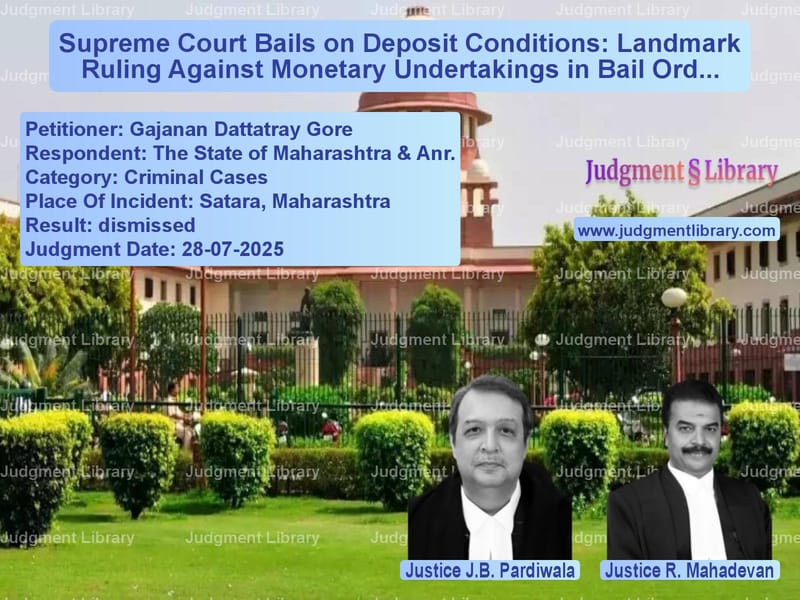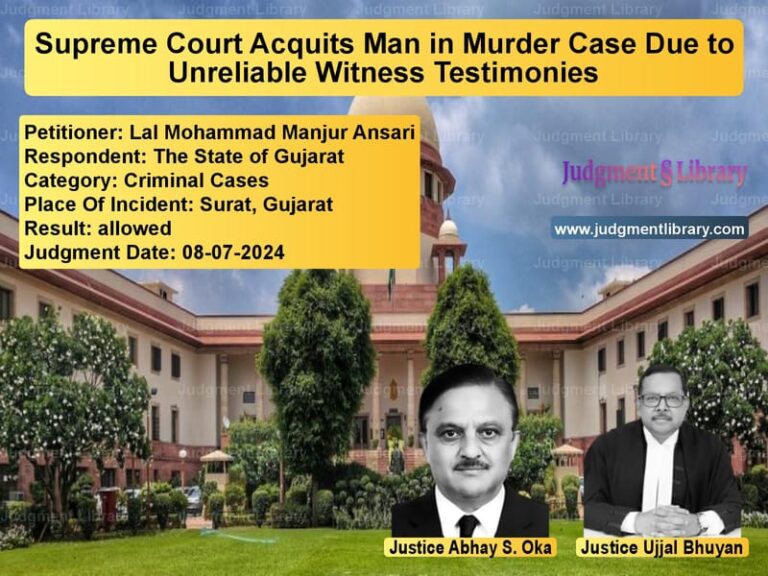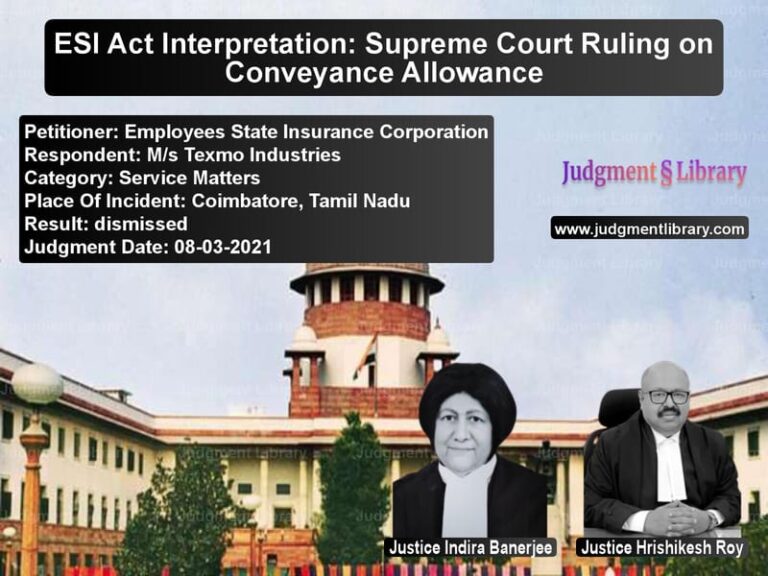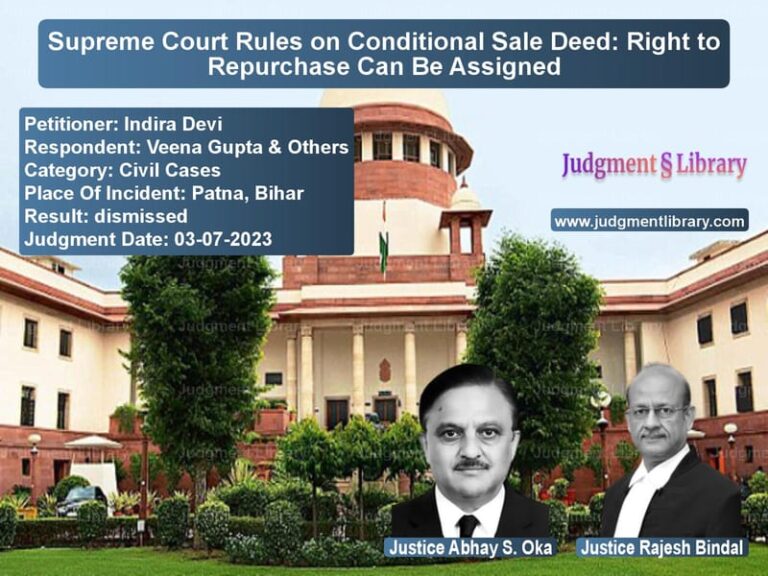Supreme Court Bails on Deposit Conditions: Landmark Ruling Against Monetary Undertakings in Bail Orders
In a groundbreaking judgment that addresses a growing concern in India’s criminal justice system, the Supreme Court has put an end to the practice of granting bail based on monetary deposits or financial undertakings by accused persons. The case of Gajanan Dattatray Gore versus The State of Maharashtra & Anr. reveals how some litigants have been ‘taking courts for a ride’ by making promises they never intend to keep, only to secure their freedom and then renege on their commitments.
The story begins with Gajanan Dattatray Gore, a 31-year-old business development manager who found himself in serious legal trouble. He was arrested on August 17, 2023, in connection with Crime No.652 of 2023 registered at Satara City Police Station in Maharashtra. The charges against him were serious – Sections 406 (criminal breach of trust), 408 (criminal breach of trust by clerk or servant), 420 (cheating), 467 (forgery of valuable security), 468 (forgery for purpose of cheating), 471 (using as genuine a forged document), 504 (intentional insult with intent to provoke breach of peace), and 506 (criminal intimidation) read with Section 34 (common intention) of the Indian Penal Code.
The prosecution’s case was that the complainant ran Satara Advertising Company and I-Can Training Institute, which had several branches across Maharashtra. Gore was employed as a business development manager for both these institutes and was allegedly paid between Rs.10,000 to Rs.30,000 per month. The core allegation was that Gore had siphoned off a massive amount of Rs.1.66 crores from the legitimate funds belonging to the complainant.
After the Trial Court declined to release him on regular bail, Gore approached the Bombay High Court with Bail Application No.445/2024. During the hearing, something unusual happened. Gore filed an affidavit-cum-undertaking dated March 22, 2024, where he voluntarily stated: ‘I say that, I undertake to deposit 25,00,000/- (Twenty Five Lakhs Only) within 5 months before this Hon’ble Court for showing my bonafide before this Hon’ble Court.’ He also undertook not to use the name or logo of I CAN Institute for his personal or business purposes.
The High Court, in its order dated April 1, 2024, treated these statements as an undertaking to the court and noted that ‘learned counsel for the applicant on instructions submitted that the applicant is willing to abide by the statements made in the affidavit. The statements are accepted.’ Based substantially on this undertaking, the High Court ordered Gore’s release on bail with several conditions, including the crucial condition that ‘the amount of Rs.25 lakhs be deposited in the trial Court instead of this Court which shall abide by the final outcome of the trial Court’s order.’
Gore secured his freedom but failed to deposit the Rs.25 lakhs as promised. This led the original complainant to file an interim application seeking cancellation of the bail granted by the High Court. The complainant’s counsel argued before the High Court that ‘Respondent No. 1 while seeking bail had made representation to this Court, by which he had voluntarily expressed his desire to deposit the amount in Court, as more particularly mentioned and stated in the undertaking dated 22.03.2024, supported with an affidavit. He submits that the Respondent No. 1 had called upon and persuaded this Court to consider the request for bail solely on the basis of his representations and assurances made/given in the undertaking i.e. his willingness to pay the amount. He submits that by the said mode the Respondent No.1 had prevented this Court from dealing with the bail application on merits.’
The State’s counsel supported this position, stating that ‘the Respondent No.1 had himself volunteered to deposit the amount by submitting undertaking to this Court. She submits that the application for bail was decided solely on the basis of the offer to deposit as made by the Respondent No.1. She submits that the Respondent No.1 having offered to deposit the amount out of his own free will and after having taken benefit of such representations, Respondent No.1 cannot be permitted to resile from the undertaking.’
Gore’s counsel, however, took a completely different stance. He argued that ‘the bail condition 6(i) imposed by this Court in its order dated 01.04.2024 in Bail Application No. 445 of 2024 is onerous conditions. He submits that such condition while granting bail is not tenable.’ He relied on several Supreme Court decisions to contend that financial deposit as a condition for bail is impermissible and that criminal courts should not act as recovery agents.
The High Court, in its impugned order dated July 1, 2025, strongly deprecated this practice of making voluntary offers and then reneging on them. The Court observed that ‘Respondent No.1 by voluntarily offering deposit of amount, while seeking indulgence of this Court to have his liberty secured and restored, foreclosed consideration of his bail application on merits. Respondent No.1 by his conduct persuaded this Court not to go into the merits.’ The Court further noted that ‘Respondent No.1 as and by way of an after thought, is attempting to renege by contending the said bail condition to deposit amount, to be onerous. Such practice has been deprecated by the Hon’ble Supreme Court.’
The High Court specifically referred to the Supreme Court’s observations in Kundan Singh vs. The Superintendent of CGST and Central Excise, where the Court had stated: ‘We strongly deprecate this practice. If the offer for monetary deposit had not been made, at the outset, the High Court may have considered the case on merits and may have granted or may not have granted relief to the petitioner. Today the petitioner is approbating and reprobating. We are conscious of his rights under Article 21 of the Constitution of India, but we have to be equally conscious of the sanctity of the judicial process and cannot allow parties to play ducks and drakes with the Court.’
Consequently, the High Court cancelled Gore’s bail and directed him to surrender within four weeks. Aggrieved by this order, Gore approached the Supreme Court.
The Supreme Court, comprising Justices J.B. Pardiwala and R. Mahadevan, heard the appeal and delivered a judgment that goes far beyond the individual case to address a systemic problem. The Court began by noting that ‘We have noticed over a period of time that orders of regular bail and anticipatory bail are being passed by different High Courts subject to deposit of some amount. We have come across cases like the one in hand where accused persons have gone to the extent of filing affidavits in the form of undertaking that they would deposit a particular amount within a particular period and then conveniently resile from such undertakings saying it is an onerous condition.’
The Court expressed serious concern about this trend, observing that ‘In some cases, perhaps the accused may abide by such undertaking, but our experience so far has been that in many cases the accused later would not abide and flout the undertaking. In many cases it would be argued on behalf of the accused that he had never made such a statement and the court on its own had recorded in the order that the accused is ready and willing to deposit a particular amount. At times the entire blame is thrown on the lawyer in making such statement for the purpose of obtaining order of bail or anticipatory bail as the case may be.’
In a strong indictment of the practice, the Court stated: ‘The case in hand is one in which the appellant on his own free will and volition filed an affidavit in the form of an undertaking before the High Court that he would deposit an amount of Rs.25,00,000/- but ultimately resiled to do so and the High Court had to cancel the bail. It was too much for the lawyer of the appellant to argue before the High Court that asking his client to deposit Rs. 25,00,000/- was unreasonable. It reflects on the professional ethics.’
The Court then issued what can only be described as a landmark directive: ‘By this order, we make it clear and that too in the form of directions that henceforth no Trial Court or any of the High Courts shall pass any order of grant of regular bail or anticipatory bail on any undertaking that the accused might be ready to furnish for the purpose of obtaining appropriate reliefs. The High Courts as well as the Trial Courts shall decide the plea for regular bail or anticipatory bail strictly on the merits of the case. The High Courts and the Trial Courts shall not exercise their discretion in this regard on any undertaking or any statement that the accused may be ready and willing to make.’
In unequivocal terms, the Court declared: ‘This practice has to be stopped. Litigants are taking the courts for a ride and thereby undermining the dignity and honor of the court. We hope and trust that the High Courts as well as the Trial Courts across the country do not commit the same mistake again.’
The Court was particularly critical of Gore’s conduct, noting that ‘the appellant has made a mockery of justice. He could be said to have abused the process of law.’ The Court suggested that ‘If at all the High Court wanted to release the appellant on bail, it should have first asked him to deposit the amount within a particular period of time and upon such deposit the appellant could have been released.’
However, looking forward, the Court made its position crystal clear: ‘Be that as it may, now we have made ourselves very clear that there shall not be a single order that the High Courts and the Trial Courts shall pass for grant of regular bail or anticipatory bail on the basis of any accused or his/her family members giving an undertaking to deposit a particular amount. The plea shall be decided strictly on merits in accordance with law. If the case is made out on merits the court may exercise its discretion and if no case is made out on merits the court shall reject the plea for regular bail or anticipatory bail as the case may be. However, in any circumstances the High Courts or trial courts shall not pass a conditional order of regular bail or anticipatory bail.’
The Supreme Court dismissed Gore’s appeal and imposed a cost of Rs.50,000 for ‘gross abuse of the process of law and taking the High Court as well as this Court for a ride.’ The Court also directed that ‘the Registry is directed to circulate one copy each of this order to all the High Courts at the earliest,’ ensuring that the directive reaches every court across the country.
However, the Court provided a recourse for Gore, stating that ‘once the appellant surrenders and is taken in judicial custody, it shall be open for him to file a fresh regular bail application before the Court concerned and such bail application shall be decided strictly on its own merits and in accordance with law.’
This judgment marks a significant moment in India’s criminal jurisprudence. It reaffirms that bail decisions must be based on legal merits rather than financial capabilities or empty promises. The Court’s strong stance against the practice of using monetary deposits as bail conditions protects the integrity of the judicial process and ensures that wealth does not become a determining factor in securing freedom during trial. At the same time, it prevents litigants from manipulating the system by making promises they have no intention of keeping, thereby preserving the sanctity of court proceedings and maintaining public confidence in the justice delivery system.
Petitioner Name: Gajanan Dattatray Gore.Respondent Name: The State of Maharashtra & Anr..Judgment By: Justice J.B. Pardiwala, Justice R. Mahadevan.Place Of Incident: Satara, Maharashtra.Judgment Date: 28-07-2025.Result: dismissed.
Don’t miss out on the full details! Download the complete judgment in PDF format below and gain valuable insights instantly!
Download Judgment: gajanan-dattatray-go-vs-the-state-of-maharas-supreme-court-of-india-judgment-dated-28-07-2025.pdf
Directly Download Judgment: Directly download this Judgment
See all petitions in Bail and Anticipatory Bail
See all petitions in Fraud and Forgery
See all petitions in Theft and Robbery Cases
See all petitions in Legal Malpractice
See all petitions in Contempt Of Court cases
See all petitions in Judgment by J.B. Pardiwala
See all petitions in Judgment by R. Mahadevan
See all petitions in dismissed
See all petitions in supreme court of India judgments July 2025
See all petitions in 2025 judgments
See all posts in Criminal Cases Category
See all allowed petitions in Criminal Cases Category
See all Dismissed petitions in Criminal Cases Category
See all partially allowed petitions in Criminal Cases Category







